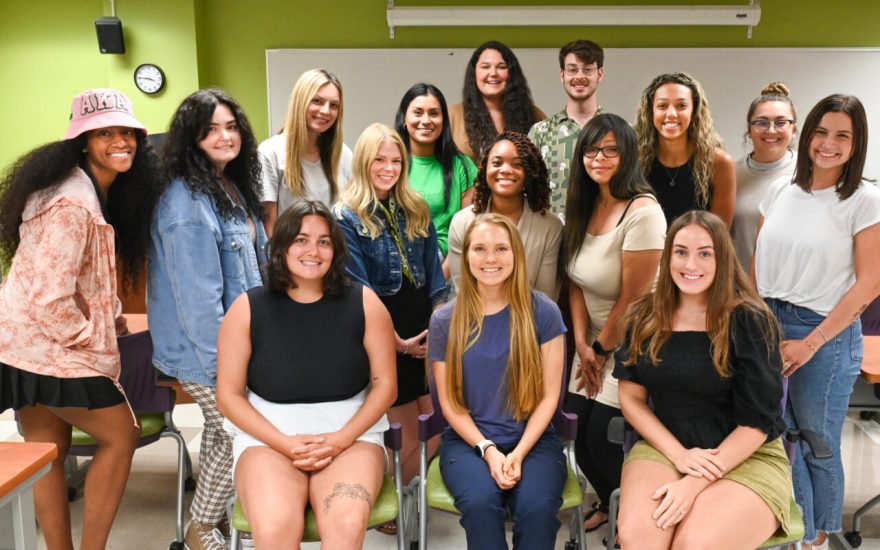
ABSN students Sierra Davis, left, and Jasmin Sifuentes during the first day of class on Monday, Aug. 21. Photo by Angela Foster.
Students in the new Accelerated Bachelor’s degree in Nursing (ABSN) program at the University of Tennessee at Chattanooga are beyond busy now that classes have started.
And every second counts.
That’s because in just three semesters—about a year from now—they are to have satisfied all requirements for a bachelor’s degree in nursing.
Each student in the program already has an undergraduate degree in another field, which means they are skipping all the prerequisites, general education and elective courses that typical full-time nursing undergraduates cannot.
The nursing curriculum, course work and clinical patient hours required for an undergraduate nursing degree are exactly the same in both the ABSN and traditional BSN programs at UTC.
Of the 59 credit hours required by the ABSN program, more than a third—21 credit hours—will be completed in clinical settings, giving essential hands-on experience
The pace, however, is the big difference, said Kristen Carroll, a clinical assistant professor who is teaching two accelerated nursing courses this semester.
“Our traditional nursing curriculum is immersive but the accelerated program takes it even further. This is like learning a new language by being dropped off in the country where you’re learning it. They’re eating, sleeping and breathing nursing,” Carroll said.
“It’s a small class of 16, so they get a lot of attention and support. We are very student-focused,” she said.
With one degree already under their belts, the ABSN students aren’t new to higher education. Some in the program are working toward second careers while others, like Kaylea-Beth Ware, have backgrounds in health care.
Originally focused on attending medical school, the Idaho native earned an undergraduate degree in biology and a master’s in public health from Idaho State University.
As a medical scribe, Ware has worked closely with physicians and said the experience gives her a unique perspective, especially with developing rapport with patients.
“Being patient-focused as a nurse vs disease-focused as a doctor is something I’m looking forward to in nursing,” she said.
Between the rigorous and time-consuming ABSN program and her part-time, remote job, Ware said making it all work involves “very meticulous planning.”
“I have to have a good schedule for everything and stick to it. It’s all about routine and schedule,” she said.
Ware has even developed study methods to help her retain the massive amount of information she will learn in the accelerated program.
“It’s all about building a schedule that allows me to get everything done and not getting overwhelmed,” she said.
Universities and colleges throughout the U.S. are increasingly offering accelerated undergraduate nursing programs because of both the demand for nursing professionals and the needs and circumstances of prospective students.
Ranked the top nursing school in Tennessee by Nursing.org, UTC offers a traditional BSN, the accelerated BSN, an online RN-BSN and five concentrations in the Doctor of Nursing Practice program.
Learn More
Visit the UTC School of Nursing

The first UTC ABSN cohort—Front row seated, from left: Addison Holt, Stephanie Peterson and Angela Livarchuk; middle row: Taniya Nichols, Colleen Roberts, Michaela Price, Gabby Turner, Jasmin Sifuentes, Kai Terry, Esther Obi, Sierra Davis, Kaylea-Beth Ware and Tori Rives; back row: Katelyn Nash and Graham Anderson. Not pictured: Allie Dexter.
